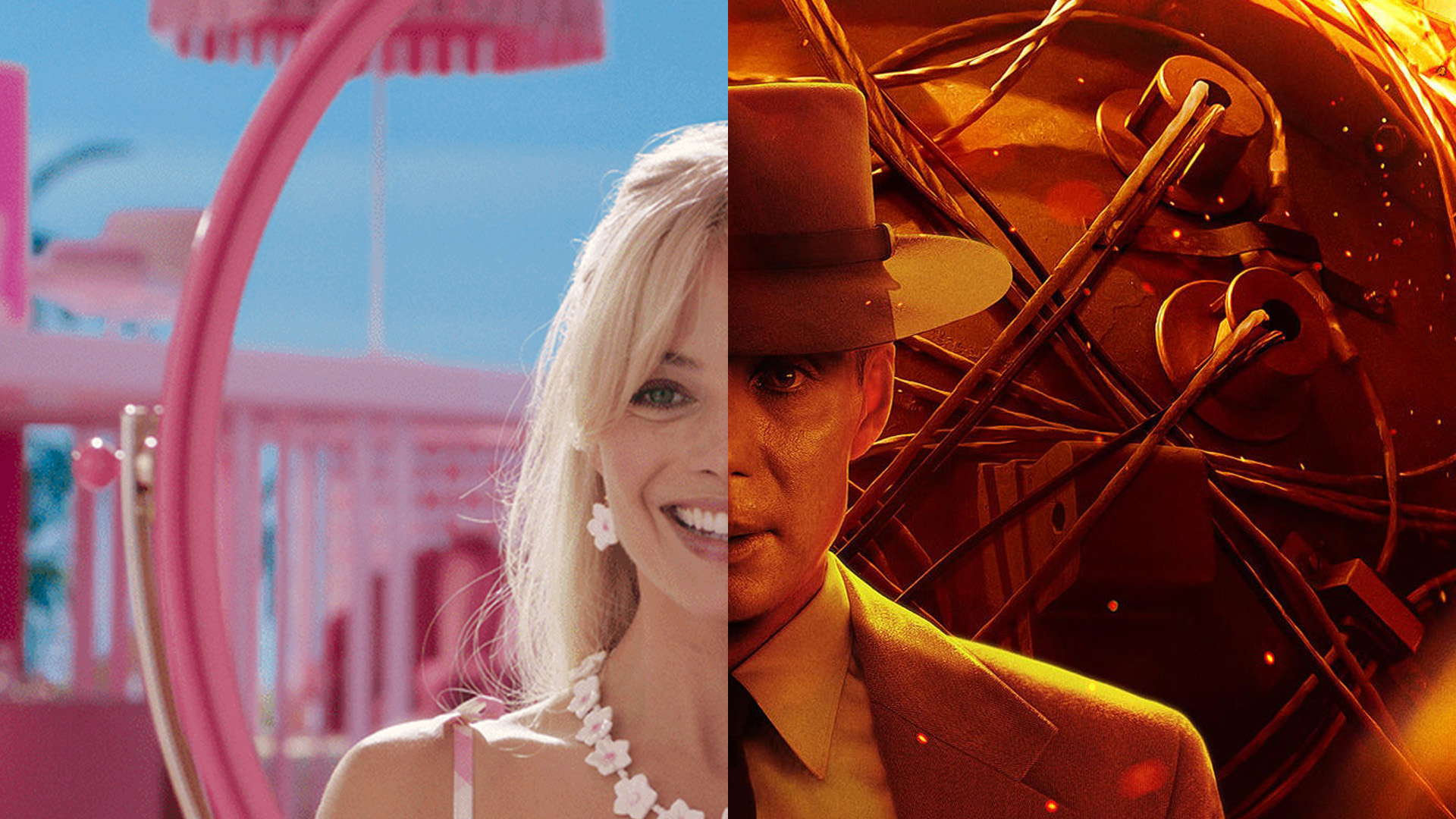
With “Barbenheimer” flooding the internet with memes, inspiring fashion trends and smashing box office records left and right, it can be easy to overlook the merits of the individual movies themselves.
Which begs the question: do “Barbie” and “Oppenheimer” live up to the hype that its double feature phenomenon has generated?
In a word, yes — and then some!
It should come as no surprise that Greta Gerwig and Christopher Nolan — two Oscar-nominated directors working at the height of their creative powers — do not disappoint. What is surprising, however, is the striking similarities the two seemingly opposed films share.
While, yes, “Barbie” is a playfully tongue-in-cheek comedy and “Oppenheimer” a dark and dense historical drama, both deal with existential crises. Or, as Barbie herself puts it, “irrepressible thoughts of death… and cellulite.”
Well, maybe cellulite doesn’t figure quite as prominently in “Oppenheimer,” but the point still stands! Read on for a brief (spoiler-free!) review of the two films that, together, have ushered in the “movie event of the year.”
“Barbie”
“Barbie” is, in many ways, a (pink) paradox.
The film is, on one hand, a Hollywood blockbuster, created under the watchful eye of a multinational corporation and buoyed by a multi-million-dollar marketing campaign.
But it’s also thrillingly weird, subversive and political. It’s a commercial film that manages to be as “un-commercial” as possible. That’s thanks, in large part, to the film’s director, Greta Gerwig, who co-wrote the screenplay with her partner Noah Baumbach.
The story opens on a day in the life of “Stereotypical Barbie,” played with effervescent aplomb by Margot Robbie (who also serves as one of the film’s producers). Barbie begins her day, as she does every day, by gracefully floating from her DreamHouse roof into her pink convertible and cheerfully greeting the many other Barbies who inhabit Barbie Land.
After withstanding some unrequited attention from wannabe wooer Ken (Ryan Gosling), Barbie caps the night with, as she puts it, a “giant blowout party with all the Barbies and planned choreography and a bespoke song.”
In other words, Barbie pretty much has the best day ever — until she doesn’t. During the party, Barbie inadvertently wonders aloud, “Do you guys ever think about dying?”
The existential query stops the party in its tracks, sending Barbie into a psychological tailspin that results in, among other things, a cold shower, a free-fall drop from her roof and (gasp!) flat feet.
From there, Barbie goes searching for answers, launching herself on an unexpected journey that takes her to the “real world,” back to Barbie Land and into the deepest corners of the human soul.
All of this unfolds under Gerwig’s deft and deliriously free-wheeling direction. The multitalented auteur brings the pink, plastic paradise of Barbie Land to vivid, kaleidoscopic life, opting for painted backdrops and in-camera props that call to mind the dream-like vistas of classic Hollywood musicals — a visual aesthetic Gerwig calls “authentic artificiality.”
That dichotomy extends into the film’s plot, which is equally lighthearted and big-hearted.
For years now, Gerwig has proved herself to be one of Hollywood’s most emotionally intuitive screenwriters. But with “Barbie,” she outdoes herself, seamlessly weaving serious themes of mortality, female autonomy and patriarchal oppression into a colorful, uplifting and uproarious comedy-drama.
It’s a rare achievement of commercial filmmaking that manages to entertain and inspire, daring its audience to live fuller, dream bigger and — like Barbie — think outside the box.
“Oppenheimer”
Few filmmakers can elicit as much anticipation for a new project as Christopher Nolan. His latest, “Oppenheimer,” is a three-hour, dialogue-laden character study, but its release has generated the kind of buzz usually reserved for only the biggest action franchises.
And for good reason. The film moves, sounds and feels like a high-octane thriller, despite featuring zero shootouts, fist fights or superhero capes. Instead, “Oppenheimer” succeeds squarely on the potency of its ideas, on the moral quandaries and serious self-reflection it stirs within its audience.
Drawing its name from J. Robert Oppenheimer, the infamous “father of the atomic bomb,” the film traces the theoretical physicist’s involvement in the Manhattan Project, as well as the personal and public struggles that engulfed him following the war.
Of course, this being a Nolan film, these events unsurprisingly unfold in a nonlinear timeline. Nolan alternates between Oppenheimer’s role in developing the atomic bomb and two Cold War-era hearings some years later, one of which is seen from the perspective of Lewis Strauss, a political adversary.
In another filmmaker’s hands, these shifting timelines could have easily resulted in a muddled and dramatically inert character arc. But thanks to Nolan’s innate sense of large-scale storytelling, “Oppenheimer” never loses its narrative focus.
It does help that Cillian Murphy, a long-time supporting actor in Nolan’s films, provides the emotional anchor for the sprawling story in an Oscar-worthy, career-best performance. Murphy doesn’t just act; he haunts the screen as J. Robert Oppenheimer, embodying the physicist with a quiet unease that radiates a tortured inner life.
Joining Murphy is a star-studded cast that includes Robert Downey Jr., Emily Blunt, Matt Damon, Florence Pugh and Kenneth Branagh. Under Nolan’s assured direction, the talented ensemble transforms otherwise simple scenes of people talking into titanic confrontations of cataclysmic proportions.
Ludwig Göransson’s celestial, electrifying score elevates these scenes even further, as does Nolan’s knack for larger-than-life compositions (the director famously shot the movie on IMAX and large-format film).
What emerges is not just one of Nolan’s most visually stunning films to date but also his most emotionally present. Sure, “Oppenheimer” is a pulse-pounding thriller, but it’s also angry, empathetic and mournful — a cautionary chronicle of one man’s brilliance being reshaped into darkness.
“Barbie” and “Oppenheimer” are now playing at the Varsity Cinema.
— Clinton Olsasky

